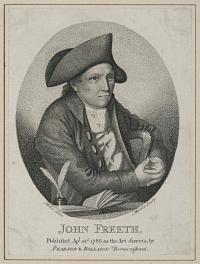Results 1-2 of 2
<<< Previous 1 Next >>>

Generall Elliot. European Magazine.
Miller del.t W: Angus Sculp. From a Painting in the Possession of Mrs. Fuller his Daughter.
Published Oct.r 1. 1782, by J. Fielding, Paternoster Row, I. Sewell, Cornhill, & I. Debrett, Piccadilly.
Engraving. Plate 177 x 115mm. 7 x 4½".
George Augustus Eliott, 1st Baron Heathfield, KB (1717-1790) was a British Army officer most notable for his command of the Gibraltar garrison during the Great Siege of Gibraltar. Eliott was educated at University of Leiden and studied artillery and other military subjects at the école militaire of La Fère in France. He served with the Prussian Army 1735-1736, and, in 1741, joined the 2nd Troop of Horse Grenadier Guards, of which his mother's brother, William Elliot of Wells, was then Lieutenant-Colonel, and of which Eliott was afterwards Lieutenant-Colonel. He served throughout the War of Austrian Succession 1742-1748, being wounded at the Battle of Dettingen and present at the Battle of Fontenoy. Eliott was made ADC from 1756-1759 to King George II. On 10 March 1759, he raised, and was appointed colonel of, the 1st Light Horse, and he distinguished himself in the German campaign, particularly the Battle of Minden. He was promoted to Major-General in 1759 and took part in the British expedition against Cuba in 1762, being 2nd-in-charge at the capture of Havana. He was promoted to Lieutenant-General in 1765. From 1774 to 1775 he was Commander-in-Chief to Ireland, Governor of Londonderry and Culmore. On March 6, 1775, he became a Privy Counsellor, and on May 25, 1777 he was appointed Governor of Gibraltar, succeeding Robert Boyd, the acting Governor. He was promoted to General in 1778. The Great Siege of Gibraltar lasted from 1779 to 1783, and on January 8, 1783, the British Parliament sent official thanks to George Eliott and he was awarded the Knight of the Bath. By February 6, 1783, the siege was over. In 1787, he was created Lord Heathfield, Baron Heathfield of Gibraltar, and in May of 1788 George was formally installed as Knight of the Bath.
[Ref: 20111] £80.00
(£96.00 incl.VAT)

John Freeth,
Miller delin. Martin Sculp.
Publish'd Apl: 22d. 1788 as the Act directs, by Pearson & Rollason Birmingham.
Stipple, sheet 140 x 105mm. 5½ x 4¼". Trimmed to plate and glued to album page.
A rare portrait of John Freeth (1731 - 1808), political ballad writer and innkeeper. By 1768 Freeth had become landlord of the Leicester Arms, Birmingham, where he remained until his death in 1808. Freeth’s Coffee House, as the Leicester Arms was known, became one of the most celebrated taverns in England. It was Freeth’s custom to write songs setting his words to popular tunes about remarkable events in local and national news, and to sing them nightly to the company assembled at his Coffee House. The habit was profitable: it crowded the place with patrons, attracted eminent visitors, and, since Freeth wrote as a determined radical and Nonconformist, it created a political meeting-place. The interest aroused by his songs encouraged Freeth to publish them, and the words of nearly 400 songs appeared in more than a dozen collections between 1766 and 1805.
[Ref: 10489] £75.00
(£90.00 incl.VAT)
<<< Previous 1 Next >>>

